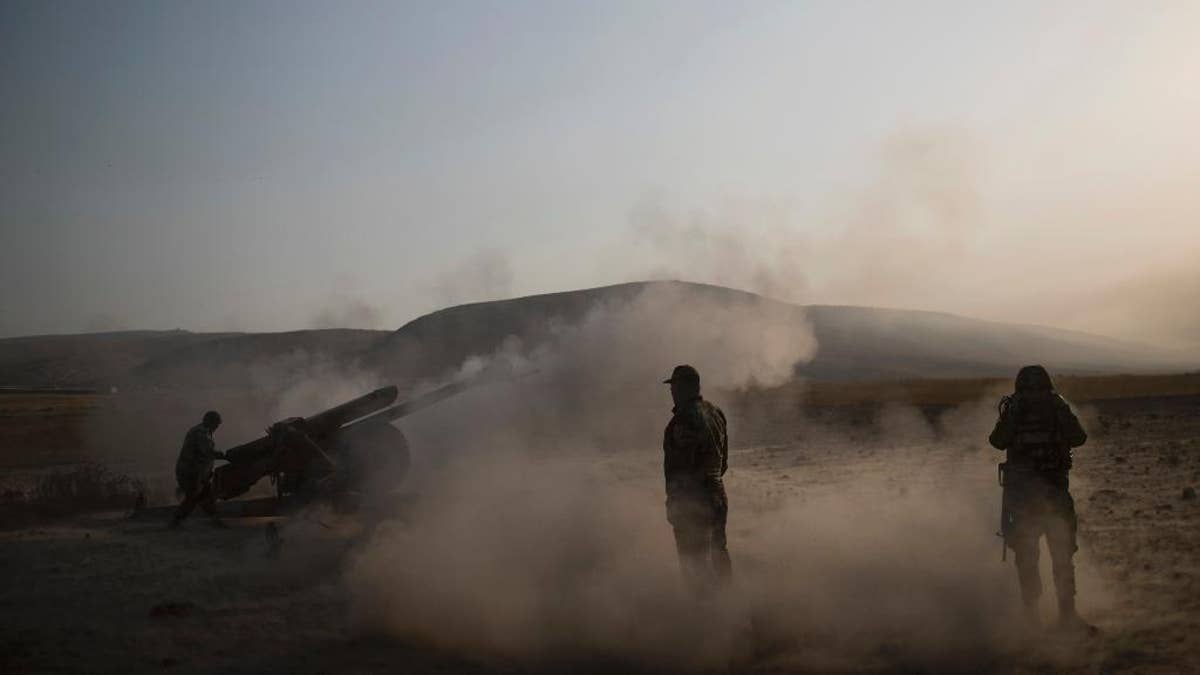
Kurdish Peshmerga soldiers fire artillery at Islamic State positions in Bashiqa, east of Mosul, Iraq, Monday, Nov. 7, 2016. Iraqi Kurdish fighters exchanged heavy fire with IS militants early on Monday as they advanced from two directions on a town held by the Islamic State group east of the city of Mosul. (AP Photo/Felipe Dana) (The Associated Press)
BAGHDAD – Iraqi Kurdish fighters exchanged heavy fire with militants early on Monday as they advanced from two directions into a town held by the Islamic State group east of the city of Mosul. Meanwhile, troops advancing south of Mosul discovered a mass grave with some 100 decapitated bodies.
Here is a look at the main developments on the 21st day of the Mosul Offensive:
PUSH FROM THE EAST
The offensive to reclaim the town of Bashiqa is part of the broader push to drive IS out of Mosul, Iraq's second-largest city and the militants' last major urban stronghold in the country.
Combat began at dawn with a Kurdish barrage of heavy artillery, Katyusha rockets and mortar rounds slamming into IS positions, providing cover for the advance of armored columns.
Smoke rose from town throughout the day, with large explosions sending dark clouds into the sky.
MASS GRAVE FOUND
On Mosul's southern front, Iraqi soldiers were advancing into Hamam al-Alil, some 12 miles (20 kilometers) from the city center. Private broadcaster Lebanon-based Al-Mayadeen showed images of soldiers hoisting the Iraqi flag on a rooftop in the town.
Army spokesman Brig. Firas Bashar said the city had been retaken, although fighting still continued and other reports said that IS fighters remained in several areas.
IN MOSUL, TROOPS QUESTION CIVILIANS
As Iraqi forces struggle to solidify gains in neighborhoods in eastern Mosul, more and more civilians are fleeing the city. At a checkpoint on the edge of Gogjali, Mosul's easternmost neighborhood, civilians fleeing Mosul were screened to catch any IS fighters who may be hiding among them. Since Iraqi forces first pushed into the eastern edge of the city last Tuesday, dozens of people have been arrested.
At the checkpoint, men were waiting for their names to be screened by a pair of informants from the area and multiple Iraqi government databases. Women and children waited further back from the road in the shade of an abandoned building.
U.N. SENDING EMERGENCY AID TEAMS
Meanwhile, the U.N. health agency said it has set up 82 "rapid response teams" to manage risks of epidemics, chemical exposure and other health worries among people fleeing Mosul.
The World Health Organization says that water and sanitation in camps for displaced people could "face disruptions" as the numbers of those who fled Mosul is growing, raising the risk of food- and water-borne diseases such as cholera. It also says that additional concerns include children who reportedly haven't been immunized since the radical Islamic State group seized control of Mosul in June 2014.




















